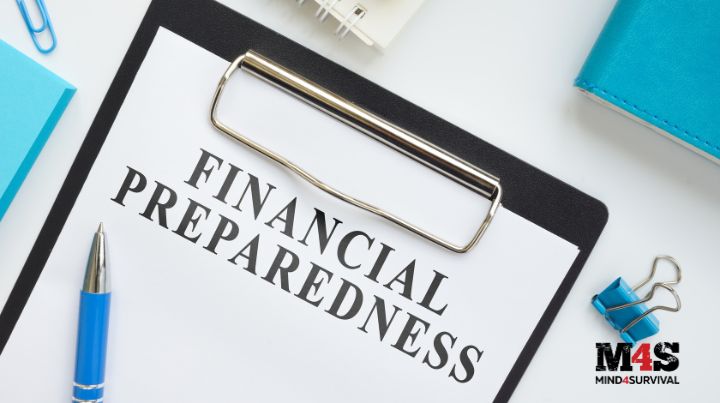7 Tips for Financial Preparedness (Budgeting for Resilience)

Financial preparedness is a cornerstone of survival planning, often overshadowed by stockpiling goods and mastering survival skills. While these are undoubtedly crucial, neglecting your financial health can leave you vulnerable when disaster strikes. Therefore, it's imperative to recognize the importance of financial stability in times of crisis and learn practical strategies to secure your economic well-being before times get hard. To help with that, here are 7 tips for financial preparedness and budgeting for survival in the face of adversity.
1. Establish an Emergency Fund: Building Your Safety Net
Building an emergency fund is a cornerstone of financial preparedness, akin to constructing a safety net to catch you when unexpected challenges arise. In today's uncertain world, where job security and economic stability can fluctuate unpredictably, having a financial cushion is essential for weathering storms. Initially, setting a modest goal of $1000 is a practical starting point, providing immediate relief for minor emergencies like car repairs or medical expenses. However, the ultimate aim is to accumulate a more substantial reserve equivalent to three to six months' worth of living expenses.
As you contribute to your emergency fund, you're not just saving money—you're investing in peace of mind and resilience. The financial buffer of an emergency fund acts as a shield against life's curveballs, offering reassurance that you can navigate tough times without plunging into financial distress. Whether it's an unexpected medical bill, sudden home repair, or unforeseen job loss, having savings set aside specifically for emergencies empowers you to face life's challenges confidently. Moreover, gradually expanding your emergency fund to cover several months' expenses will build a solid foundation for long-term financial stability, safeguarding your livelihood and future despite economic downturns.
Establishing an emergency fund is about prioritizing your financial well-being and adopting a proactive approach to managing life's uncertainties. It's about recognizing that unexpected expenses are not a matter of if but when they'll occur and preparing accordingly. By cultivating the discipline to consistently contribute to your emergency fund and resist the temptation to dip into it for non-essential expenses, you're laying the groundwork for financial security and creating peace of mind. In times of crisis, having a well-funded safety net can make all the difference, allowing you to navigate economic troubles with resilience and confidence.
2. Crafting a Comprehensive Budget: Mapping Your Financial Journey
Crafting a comprehensive budget is akin to laying out a detailed map for your financial journey. It involves meticulous planning and foresight to track every dollar earned and spent and provides a thorough understanding of your financial landscape by categorizing expenses and income streams. This clarity enables you to identify areas where you can cut costs, redirect funds towards savings or investments, and ensure that every dollar serves a purpose in advancing your financial goals.
Moreover, a well-structured budget is a powerful tool for decision-making and prioritization. It allows you to allocate resources strategically, balancing immediate needs with long-term aspirations. Whether setting aside funds for an emergency fund, retirement savings, or pursuing a passion project, a comprehensive budget empowers you to make informed choices that align with your goals. Think of it as navigating a course toward financial independence and security, with each decision moving you closer to your desired destination.
3. Tackling Debt: Liberating Yourself from Financial Burdens
High-interest debts, particularly those accrued through credit cards, can weigh down your financial well-being. These debts often come with compounding interest rates, which can spiral out of control if left unchecked. Addressing debt should be a top priority in your financial preparedness journey. Start by creating a comprehensive overview of your outstanding debts, including balances, interest rates, and minimum monthly payments. With this information, create a strategic plan to tackle your debts systematically.
Consider utilizing the debt avalanche or debt snowball method to prioritize repayment. The debt avalanche method involves paying off debts with the highest interest rates first. In contrast, the debt snowball method focuses on first paying off the smallest debts to gain momentum. Whichever approach you choose, committing to regular payments above the minimum requirements can accelerate your progress toward financial freedom.
As you chip away at your debts, monitor your spending habits closely to avoid accumulating further debt. Cut back on discretionary expenses and redirect those funds towards debt repayment. Additionally, explore opportunities to negotiate lower interest rates or consolidate high-interest debts into more manageable payment plans. Seeking professional guidance from financial advisors or credit counselors can also provide valuable insights and support in your debt repayment journey. Remember, the path to financial freedom may require sacrifice and discipline, but the rewards of liberating yourself from debt are well worth the effort.
4. Embracing Investment Diversification: Planting Seeds for Financial Growth
Diversifying your investments is like planting a diverse range of crops, each with its own growth potential and resilience to different conditions. By spreading your investments across various asset classes, such as precious metals, stocks, real estate, and cryptocurrencies, you reduce the risk of your entire portfolio being negatively impacted by the performance of a single asset. This diversification strategy aims to optimize returns while minimizing overall risk exposure.
However, it's essential to tailor your investment approach to align with your unique financial goals and risk tolerance. Consider factors such as your investment timeline, liquidity needs, and comfort level with volatility when crafting your diversified portfolio. By embracing investment diversification, you enhance your potential for financial growth and build a more stable financial foundation capable of withstanding market fluctuations and economic uncertainties.
5. Prioritize Your Essentials: Safeguarding the Basics
In budgeting, it's paramount to prioritize essentials such as food, water, shelter, healthcare, etc. These fundamental needs form the cornerstone of preparedness, ensuring you and your loved ones have the necessary resources to weather any storm. Allocate your financial resources thoughtfully by recognizing the critical role these essentials play in sustaining life during times of crisis.
Additionally, consider the long-term sustainability of your essential resources beyond your immediate needs. Invest in tools and strategies that enhance self-sufficiency, such as water purification systems, non-perishable food storage solutions, and emergency medical supplies. By prioritizing essentials and planning for both short-term emergencies and long-term resilience, you can improve your preparedness while successfully managing your budget.
6. Investing in Skills: Empowering Yourself for Resilience
Investing in acquiring new skills not only enriches your life but also enhances your ability to overcome challenging situations. In today's rapidly changing world, the value of being versatile and self-reliant cannot be overstated. Learning practical skills such as home repair, gardening, or sewing saves money and makes you more independent. Imagine fixing a leaky faucet, growing your food, or mending torn clothing without having to on others who charge an arm and a leg. These abilities not only contribute to your financial resilience but also provide a sense of security, knowing that you can tackle everyday challenges.
7. Regular Review and Adaptation: Navigating Financial Terrain
Your financial landscape is dynamic and ever-changing. As such, it's imperative to establish a habit of regular review and adaptation of your budget and preparedness plans. Set aside dedicated time, whether monthly, quarterly, or annually, to objectively assess your financial situation. During these reviews, scrutinize your income streams, expenses, debt repayment progress, and investment performance. Identify areas of improvement and opportunities for optimization.
Also, prepare yourself to deal with external factors that may impact your financial stability. Pay attention to financial impacting fluctuations in the economy, legislative changes, or personal life events. Be ready to pivot and adjust your strategies, ensuring they align with your overarching goals and values. Embrace a mindset of flexibility and self-reliance. Recognizing that the ability to adapt is often the difference between thriving and merely surviving in the face of uncertainty.
The Bottom Line on 7 Tips for Financial Preparedness and Budgeting for Survival
Financial preparedness is a cornerstone of self-reliance, often overshadowed by the more fun and glamorous areas of preparedness. However, its importance cannot be overstated. By implementing these strategies, you're not just preparing for emergencies. You're securing your future and fortifying yourself against whatever challenges come your way.
What tips do you have that can help others become financially stable? Share your insights in the comments below.
Additional Resources:
- How to Prep for Economic Downturns and Financial Collapse
- How to Start Prepping on a Budget with the Basics
- 12 Barter Skills for Preppers
- What is Modern Monetary Theory
Stay safe,

Related Articles
FREE Guide
Read the Best Seller
Join Mind4Survival
Stay informed by joining the Mind4Survival! 100% Secure! 0% Spam!
Affiliate Disclosure...
Mind4Survival is a free, reader-supported information resource. If you make a purchase through our link, we may, at no cost to you, receive an affiliate commission.
Do You Want To Be Ready No Matter What?

Download our free 39-page guide with interactive, 7-Day Emergency Kit Checklist and take the first step toward real preparedness.
- Know exactly where to start.
- Save time and money.
- How-to build a complete Basic Emergency Kit.
- Level up your safety and security.
Join Mind4Survival
Stay informed by joining the Mind4Survival! 100% Secure! 0% Spam!








